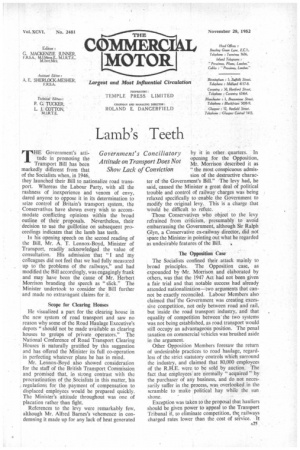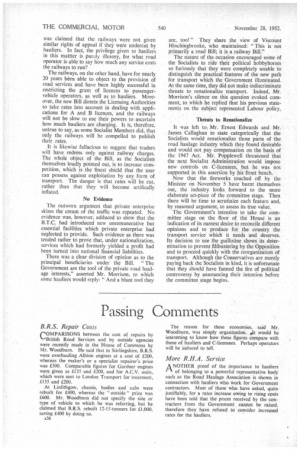Lamb's Teeth
Page 27

Page 28

If you've noticed an error in this article please click here to report it so we can fix it.
THE Government's attitude in promoting the Transport Bill has been markedly different from that of the Socialists when, in 1946, they launched their Bill to nationalize road transport. Whereas the Labour Party, with all the rashness of inexperience and venom of envy, dared anyone to oppose it in its determination to seize control of Britain's transport system, the Conservatives have shown every wish to accommodate conflicting opinions within the broad outline of their proposals. Nevertheless, their decision to use the guillotine on subsequent proceedings indicates that the lamb has teeth.
In his opening speech on the second reading of the Bill, Mr. A. T. Lennox-Boyd, Minister of Transport, readily acknowledged the value of consultation. His admission that "1 and my colleagues did not feel that we had fully measured up to the problems of the railways," and had modified the Bill accordingly, was engagingly frank and may have been the cause of Mr. Herbert Morrison branding the speech as "slick." The Minister undertook to consider the Bill further and made no extravagant claims for it.
Scope for Clearing Houses He visualized a part for the clearing house in the new system of road transport and saw no reason why some of the Road Haulage Executive's depots "should not be made 'available as clearing houses to groups of private operators." The National Conference of Road Transport Clearing Houses is naturally gratified by this suggestion and has offered the Minister its full co-operation in perfecting whatever plans he has in mind.
Mr. Lennox-Boyd also showed consideration for the staff of the British Transport Commission and promised that, in steong contrast with the procrastination of the Socialists in this matter, his , regulations for the payment of compensation to displaced employees would be prepared quickly. The Minister's attitude throughout was one of placation rather than fight.
References to the levy were remarkably few, although Mr. Alfred Barnes's vehemence in condemning it made up for any lack of heat generated by it in other. quarters. In opening for the Opposition, Mr. Morrison described it as "the most conspicuous admission of the destructive character of the Government's Bill." The levy had, he said, caused the Minister a great deal of political trouble and control of railway charges was being relaxed specifically to enable the Government to modify the original levy. This is a charge that would be difficult to refute.
Those Conservatives who object to the levy refrained from criticism, presumably to avoid embarrassing the Government, although Sir Ralph Glyn, a Conservative ex-railway director, did not spare the Minister in pointing out what he regarded as undesirable features of the Bill. , The Opposition Case The Socialists confined their attack mainly to broad principles. The Opposition case, as expounded by -Mr. Morrison and elaborated by others, was that the 1947 Act had not been given a fair trial and that notable success had already attended nationalization—two arguments that cannot be exactly reconciled. Labour Members also claimed that the Government was creating excessive competition, not only between road and rail, but inside the road transport industry, and that equality of competition between the two systems was not being established, as road. transport would still occupy an advantageons position. The penal taxation on commercial vehicles was brushed aside in the argument.
Other Opposition Members foresaw the return of undesirable practices to road haulage, regardless of the strict statutory controls which surround the industry, and claimed that 80,000 employees of the R.H.E. were to be sold by auction. The fact that employees are normally " acquired " by the purchaser of any business, and do not necessarily suffer in the process, was, overlooked in the scramble to make political hay while the sun shone.
Exception was taken to the proposal that hauliers should be given power to appeal to the Transpert Tribunal if, to eliminate competition, the railways charged rates lower than the cost of service. It was claimed that the railways were not given similar rights of appeal if they were undercut by hauliers. In fact, the privilege given to hauliers in this mattter is purclyillusory, for what road operator is able to say how much any service costs the railways to run?
The railways, on the other hand, have for nearly 20 years been able to object to the provision of road services and have been highly successful in restricting the grant of licences to passengervehicle operators, as well as to hauliers. Moreover, the new Bill directs the Licensing Authorities to take rates into account in dealing with applications for A and B licences, and the railways will not be slow to use their powers to ascertain how much hauliers are charging. It is, therefore, untrue to say, as some Socialist Members did, that only the railways will be compelled to publish their rates.
It is likewise fallacious to suggest that traders will have redress only against railway charges. The whole object of the Bill, as the Socialists themselves loudly pointed out, is to increase competition, which isthe finest shield that the user can possess against exploitation by any form of transport. The 'danger is that rates will be cut, rather than that they will become artifically inflated.
No Evidence The outworn argument that private enterprise skims the cream of the traffic was repeated. No evidence was, however, adduced to show that the B.T.C. had introduced new unremunerative but essential facilities which private enterprise had neglected to provide. Such evidence as there was tended rather to prove that, under nationalization, services which had formerly yielded a profit had been turned into national financial liabilities.
There was a clear division of opinion as to the principal beneficiaries under the Bill. "The Government are the tool of the private road haulage interests," asserted Mr. Morrison, to which some hauliers would reply: "And a blunt tool they are, too!" They share the view of Viscount Hinchingbrooke, who maintained: "This is not primarily a road Bill; it is a railway Bill."
The nature of the occasion encouraged some of the Socialists to ride their political hobbyhorses so furiously that they were completely unable to distinguish the practical features of the new path for transport which the Government illuminated. At the same time, they did not make indiscriminate threats to renationalize transport. Indeed, Mr. Morrison's silence on this question evoked comment, to which he replied that his previous statements on the subject represented Labour policy, Threats to Renationalize
It was left to Mr. Ernest Edwards and Mr. James Callaghan to state categorically that the Socialists would renationalize those parts of the road haulage industry which they found desirable and would not pay compensation on the basis of the 1947 Act. Mr. Popplewell threatened that the next Socialist Administration would impose new controls on C-licensees, but he was not supported in this assertion by his front bench.
Now that the fireworks touched off by the Minister on November 5 have burnt themselves out, the industry looks forward to the more elaborate set-piece of the committee stage. Then there will be time to scrutinize each feature and, by reasoned argument, to assess its true value.
The Government's intention to take the committee stage on the floor of the House is an indication of its earnest desire to reconcile different opinions and to produce for the country the transport service which it needs and deserves. Its decision to use the guillotine shows its determination to prevent filibustering by the Opposition and to proceed quickly with the reorganization of transport. Although the Conservatives are merely paying back the Socialists in kind, it is unfortunate that they should have fanned the fire of political controversy by announcing their intention before the committee stage begins.




















































































